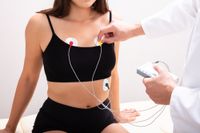Common Questions Patients Have About Stress Tests

Heart conditions can remain hidden for a long time before presenting any symptoms or complications. That’s why cardiologists usually rely on a variety of diagnostic procedures to screen for potential complications. If there are any concerns about your cardiovascular health, your doctor will likely start your evaluation with a stress test—an assessment that measures various aspects of the heart’s performance. If you need this diagnostic technique, here are a few frequently asked questions about stress tests that can help you prepare with confidence.
Stress Test FAQ
What do these assessments screen for?
Commonly, stress tests are used to screen for evidence of heart disease. They may also be used to detect heart rhythm abnormalities or reveal damage to the organ. However, if you’re already diagnosed with a cardiovascular condition, your provider may use the test results to make decisions about your treatment.
What is the difference between exercise and nuclear stress tests?
During an exercise stress test, electrodes are attached to your body to record your heart’s electrical activity with an ECG. These measurements are taken while you perform light to moderate physical activity—such as using a treadmill.
 A nuclear stress test adds to this approach by providing a closer look at the heart. First, a safe, radioactive dye is injected into your blood. This chemical makes it possible for a nuclear gamma camera to capture images of the organ. ECG measurements and images are taken once during a period of rest and again during physical activity.
A nuclear stress test adds to this approach by providing a closer look at the heart. First, a safe, radioactive dye is injected into your blood. This chemical makes it possible for a nuclear gamma camera to capture images of the organ. ECG measurements and images are taken once during a period of rest and again during physical activity.
What if it’s not safe for me to exercise?
If you’re not able to exercise due to an underlying condition or injury, your cardiologist may provide you with a drug that can simulate the effects of physical activity on your heart.
How long does the evaluation take?
Exercise stress tests take about an hour to complete. As for more involved evaluations, nuclear stress tests can take up to four hours to complete.
Will I need to do anything before the evaluation?
Before the evaluation, your cardiologist will outline any preparation requirements, such as not eating, drinking, consuming caffeine, or smoking for a predetermined amount of time. If you take any medications, ask ahead of time whether or not they will impact the test and how you should make adjustments. Since you’ll be active, it’s also best to wear comfortable athletic clothes and bring along any medications you may need, such as an asthma inhaler.
Providing comprehensive heart health services, Premier Cardiology Consultants is a leading resource for stress tests and other cardiovascular assessments. Based in Dothan, AL, Dr. Nidal Yunis and his team will guide you through every step of the evaluation and provide clear answers on what your results mean. Beyond testing and diagnostics, this clinic is also qualified to provide personalized heart disease and hypertension treatment, as well as vascular surgery. Visit this provider online for more details on their services or call (334) 699-6396 to schedule an appointment.
About the Business
Have a question? Ask the experts!
Send your question

